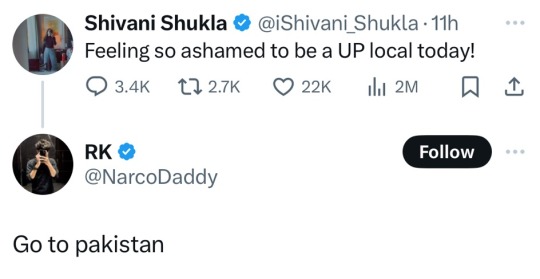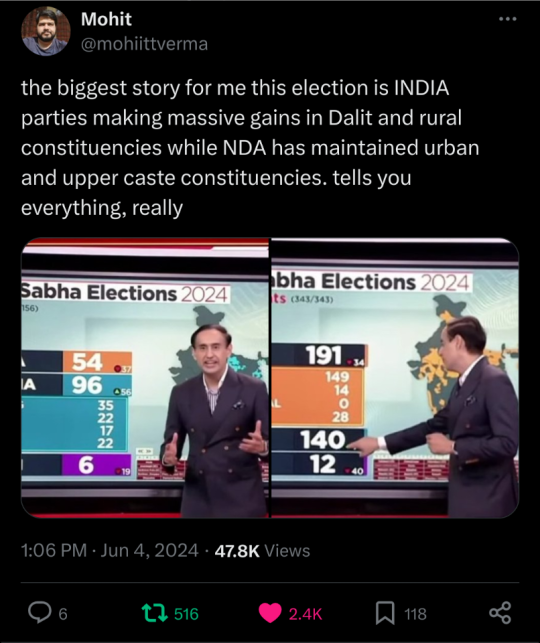#Indian Election
Explore tagged Tumblr posts
Text
thoroughly enjoying seeing jagan mohan reddy's (pretend) crying face. man deserves an Oscar for all that acting. I'm glad he got wiped out so thoroughly. even tihar jail is less for all the crimes he's committed. would have loved to see mamata banerjee get the same treatment but it seems like bengalis have a long way to go before they're disillusioned
17 notes
·
View notes
Text
A Paradigm Shift: Understanding One Nation One Election Concept

In recent years, the concept of "One Nation One Election" (ONOE) has emerged as a potential paradigm shift in the electoral landscape of India. This ambitious idea proposes to synchronize the electoral cycles of all levels of government - central, state, and local - to ensure that elections are held simultaneously across the country. Proponents argue that such a move could bring about several benefits, ranging from cost savings to increased political stability. However, the proposal has also sparked intense debate and skepticism, with critics pointing to potential challenges and questioning the fundamental principles of federalism. This article explores the key aspects of the One Nation One Election concept and the implications it carries for the world's largest democracy.
Historical Context:
The idea of synchronizing elections at various levels is not entirely new. Historically, India followed a simultaneous election cycle during the initial years post-independence. However, as the political landscape evolved, different states started adopting their own electoral calendars, leading to a situation where elections were held almost every year in some part of the country. The revival of the One Nation One Election concept is seen as an attempt to restore order and efficiency to the electoral process.
Advantages:
1. Cost Efficiency: Conducting elections is an expensive affair, and the frequency at which they occur in India puts a significant strain on the financial resources of the nation. Proponents argue that simultaneous elections would lead to substantial cost savings, as the expenses related to security, logistics, and campaigning would be consolidated into a single event.
2. Stability and Governance: Frequent elections can disrupt governance, diverting the attention of policymakers away from crucial matters. One Nation One Election aims to provide a stable and consistent government at both the central and state levels, allowing for better long-term planning and execution of policies.
3. Reduced Campaigning Fatigue: With elections happening less frequently, political parties and candidates would have more time to focus on governance and policy issues instead of being in a perpetual state of election campaigning.
Challenges and Concerns:
1. Constitutional Implications: Critics argue that the One Nation One Election concept may undermine the federal structure enshrined in the Indian Constitution. State governments fear that their autonomy and independence could be compromised, as their electoral cycles would be synchronized with the central government.
2. Logistical Challenges: India is a vast and diverse country with varying climatic conditions. Conducting elections simultaneously across all states would pose significant logistical challenges, especially in terms of security and the deployment of election machinery.
3. Political Opposition: Opposition parties argue that the One Nation One Election concept could be used to stifle dissent and opposition voices, as it might create a scenario where a single party dominates both the central and state governments for extended periods.
Conclusion:
The One Nation One Election concept is undoubtedly a radical proposal with the potential to reshape India's electoral landscape. While its proponents emphasize the benefits of cost savings, stability, and reduced campaign fatigue, critics raise legitimate concerns about its impact on federalism and the practical challenges of implementation. As India grapples with the complexities of its diverse political and social landscape, the debate surrounding One Nation One Election will likely continue, requiring a careful examination of both its merits and potential pitfalls. Ultimately, any decision regarding the adoption of this concept must strike a delicate balance between streamlining the electoral process and upholding the principles of democracy and federalism.
#One Nation One Election#One Nation One Election essay#One Nation One Election debate#One Nation One Election pros and cons#what is One Nation One Election#Indian Election
2 notes
·
View notes
Text
0 notes
Text

🗳️ As marketers, we understand the power of influence. Just like we shape brands, let’s shape our nation’s🇮🇳 destiny by casting our vote. It’s not just a civic duty; it’s an opportunity to market the change we envision. Let’s make our voices heard in the ballot box!
#please vote#vote 2024#Indian election#indian elections#vote India vote#power of voting#voting#election fever
0 notes
Text
take a moment to read indian election news!! india has voted against the ruling fascist party. while they will resume government they will need to forge alliances and have lost multiple strong members of parliament. and all this despite them controlling the media and jailing their opposers! this is SUCH an important reminder that u shld never ever underestimate the power of a vote
#global politics#politics#india#bjp#anti bjp#anti modi#current affairs#indian elections#elections#desiblr#international politics#international affairs#democracy
11K notes
·
View notes
Text
The "One Nation, One Election" (ONOE) proposal has ignited intense political discourse in India, offering a vision of electoral reform that could transform the nation's political landscape. ONOE envisions the synchronization of national and state elections, promising greater administrative efficiency and reduced financial burdens. However, the road to its implementation is rife with challenges, including the need for constitutional amendments and the logistical intricacies of conducting simultaneous elections across a vast and diverse country. Despite these challenges, ONOE represents a bold aspiration for India's democracy, signaling a desire for a more harmonized, cost-effective, and stable electoral system. As the debate continues, it underscores India's commitment to exploring innovative solutions to enhance its democratic processes and governance.
0 notes
Text

#narendra modi#desiblr#desi humor#desi girl#desi tag#being desi#desi memes#india elections#indian elections#elections#election 2024#bjp#anti bjp#Congress#desi tumblr#lol#.jpg#india news#indpol#indian politics
734 notes
·
View notes
Text

LMAOOO this has to be the funniest tweet of this election
431 notes
·
View notes
Text

damn right
350 notes
·
View notes
Text
UP people are about to experience the infamous jungle raj 2.0
10 notes
·
View notes
Text

Ram ke naam ❤
#ram really said not in my name huhhh#desiblr#indian politics#indian elections#bjp#anti bjp#desi tumblr#yeah tagging it with everything im rubbing it innnn
315 notes
·
View notes
Text
I don't know how to explain to the rest of my mutuals that india alliance wants bjp to lose so bad that they offered a post that does not exist to one of the nda's partners
268 notes
·
View notes
Text
I FUCKING LOVE THIS SONG


322 notes
·
View notes
Text
Not people saying "disappointed in UP for making the people who brought Lord Ram home lose the elections". AREN'T YOU GUYS THE SAME PEOPLE WHO WERE CURSING ME ABOUT SAYING SOMETHING ABOUT THE RAM MANDIR BY SAYING THAT IT'S A MATTER OF FAITH AND NOT POLITICS? At least stick to your own arguments, lmao.
-Mod S
#desiblr#hindublr#indian politics#indpol#india#indian elections#lok sabha elections#lok sabha 2024#mod: s
255 notes
·
View notes
